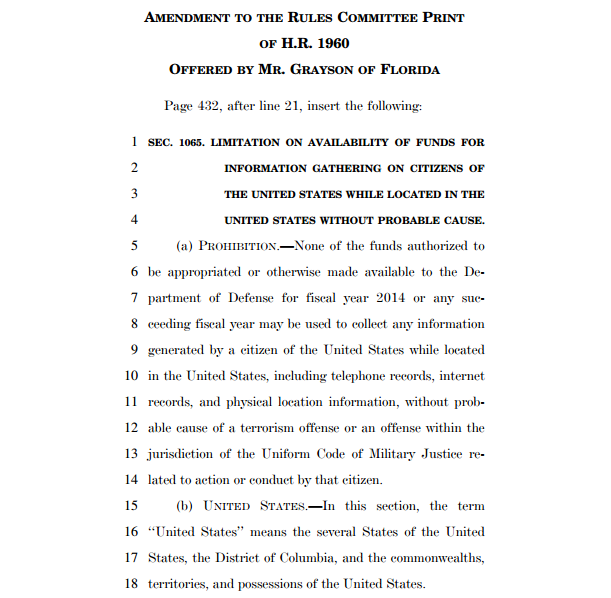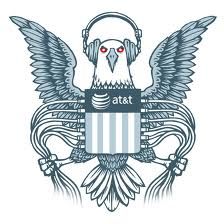Cross posted from The Stars Hollow Gazette
At Crooks and Liars, Suzie Madrak points out an important fact about private government contractors, the Fourth Amendment does not apply to them:
This has been an ongoing scandal in the Iraq and Afghanistan wars. Attorney Susan L. Burke represented several groups of plaintiffs (including Abu Ghraib detainees and female soldiers who had been sexually assaulted) in lawsuits in which she tried to overturn the civil immunity of government contractors. She has not been successful, and the federal government continues to subcontract with private companies to do things that would be illegal if they did them themselves. So keep that in mind as you read these NSA stories.
She highlights an interview with 70’s whistleblower, Chris Pyle at Democracy Now, who disclosed the military’s spying on civilian politics and worked for three congressional committees to end it.
Pyle discovered the Army and CIA were spying on millions of Americans engaged in lawful political activity while he was in the Army working as an instructor. His revelations prompted Senate hearings, including Senator Frank Church’s Select Committee on Intelligence, ultimately leading to a series of laws aimed at curbing government abuses. Now teaching constitutional law and civil liberties at Mount Holyoke College, Pyle says the NSA is known for attacking its critics instead of addressing the problems they expose.
Full transcript can be read here
CHRISTOPHER PYLE: Yes. The forerunner of the PRISM system that Snowden disclosed was called Trailblazer. It wasted $1 billion on private contracts. It replaced a much less expensive system called ThinThread, which had more privacy protections and had been developed inside the government. Now, the reason that private contractors get this business is because members of Congress intercede with them with government agencies. And we now have a situation where members of the Intelligence Committee and other committees of Congress intercede with the bureaucracy to get sweetheart contracts for companies that waste taxpayers’ money and also violate the Constitution and the privacy of citizens. This is a very serious situation, because it means that it’s much more difficult to get effective oversight from Congress. [..]
CHRISTOPHER PYLE: Well, we all want to protect the security of the country. We all want to protect the Constitution. But when government agencies are totally unaccountable, we can’t do that. Members of Congress do not go to those briefings, even if they’re offered, because once you go to the briefing, then you can’t talk about what you’ve been told, because it’s classified. So the briefing system is designed to silence Congress, not to promote effective oversight.
Members of Congress don’t want to spend time on oversight. They’re too busy raising money. New members of the House of Representatives this winter were told by the Democratic Campaign Committee that they should spend between four and six hours a day dialing for dollars. They have no time to do the public’s business. They’re too busy begging for money. President Obama himself attended 220 fundraisers last year. Where does he get the time to be president when he’s spending so much time asking wealthy people for money to support his campaign? [..]
CHRISTOPHER PYLE: Well, it’s true. The NSA doesn’t want to hire people like you and me. We don’t know enough about the Internet. That said, it’s important to note that the vice chairman of Booz Allen happens to be Mike McConnell, who was former director of NSA and of national intelligence. There is a revolving door between high government positions and private corporations, and this revolving door allows these people to make a great deal more money upon leaving the government, and then being rented back to the government in a contractor capacity. And that’s part of the corruption of the system. [..]
CHRISTOPHER PYLE: Well, yes. The Fourth Amendment of the Constitution, which protects us from unreasonable searches and seizures, only binds the government, doesn’t bind corporations. That’s a serious problem. The reason we have privatization of prisons, in some ways, is for governments to escape liability. They put the liability on the private corporations that run the prisons, and they just charge their liabilities as an operating cost.
(All emphasis by Suzie.)
The Fourth Amendment of the Constitution, which protects us from unreasonable searches and seizures, only binds the government, doesn’t bind corporations.
Got that? This is the key to the rational behind privatizing everything from schools and prisons to national security. Keep it in mind as you read anything about the NSA whistleblowing and Edward Snowden.
DSWright at FDL News Desk hits the nail on the head, Freedom isn’t free:
The National Security Agency along with the CIA, FBI and other intelligence agencies of the U.S. government has been swapping information with private companies. In exchange for private companies giving the intelligence agencies information on their users, the private companies receive access to classified intelligence. The Corporate State indeed.
Thousands of technology, finance and manufacturing companies are working closely with U.S. national security agencies, providing sensitive information and in return receiving benefits that include access to classified intelligence, four people familiar with the process said.
These programs, whose participants are known as trusted partners, extend far beyond what was revealed by Edward Snowden, a computer technician who did work for the National Security Agency. The role of private companies has come under intense scrutiny since his disclosure this month that the NSA is collecting millions of U.S. residents’ telephone records and the computer communications of foreigners from Google Inc (GOOG). and other Internet companies under court order.
No wonder the tech firms did not complain about spying on American citizens, they were getting compensation in the form of access to classified intel. So now Wall Street gets to see classified intelligence? No wonder there were no prosecutions, they’re on the team. Too Big To Fail, Too Big To Jail, and too important to National Security. The National Security Agency along with the CIA, FBI and other intelligence agencies of the U.S. government has been swapping information with private companies. In exchange for private companies giving the intelligence agencies information on their users, the private companies receive access to classified intelligence. The Corporate State indeed. [..]
No wonder the tech firms did not complain about spying on American citizens, they were getting compensation in the form of access to classified intel. So now Wall Street gets to see classified intelligence? No wonder there were no prosecutions, they’re on the team. Too Big To Fail, Too Big To Jail, and too important to National Security.
Quid pro quo, as well, as liability protection, all on the tax payer’s dime.


 In 2005 while George W. Bush still sat in the Oval Office, James Bamford penned this article for the New York Times Week in Review titled
In 2005 while George W. Bush still sat in the Oval Office, James Bamford penned this article for the New York Times Week in Review titled